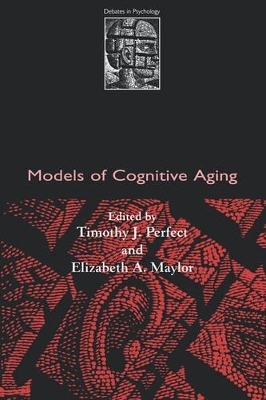
Models of Cognitive Aging
Oxford University Press (Verlag)
978-0-19-852437-3 (ISBN)
We live in an ageing society, where people are living longer, and where decreases in the birth rate mean that the proportion of the population above retirement age is steadily increasing. An ageing population has considerable implications for health services and care provision. Consequently there is a growing interest among researchers, medical practitioners, and policy makers in older adults, their capabilities, and the changes in their cognitive functioning. This book offers an up-to-the-minute account of the latest methodological and theoretical issues in cognitive ageing. Part of the Debates in Psychology series, it sets out the arguments surrounding the currently controversial questions in cognitive ageing. What is the appropriate methodology for understanding cognitive change? How many factors are necessary to understand the patterns of age-related change? What might these factors be? The topics and arguments are explored in a series of chapters by the leading researchers in the field. Each contributor offers their view of how cognitive ageing can be best understood, and together they cover a broad range of cognitive functions including language use, cognitive slowing, and memory loss. Each of the chapters stands alone as the latest review of work in the area. Taken together, the chapters form a coherent theoretical debate through which the reader will learn about the dynamic nature of cognitive ageing research, and about the direction this research will be taking in the future. Models of Cognitive Aging will be an invaluable resource for anyone with an interest in the elderly, and in their cognitive abilities.
1. Timothy J. Perfect and Elizabeth A. Maylor: Rejecting the dull hypothesis: The relation between method and theory in cognitive aging research ; 2. Timothy A. Salthouse: Steps toward the explanation of adult age differences in cognition ; 3. Paul Verhaeghen: The parallels in beauty's brow: time-accuracy functions and their implications for cognitive aging theories ; 4. Donald L. Fisher, Susan A. Duffy, and Konstantinos V. Katsikopoulos: Cognitive slowing among older adults: What kind and how much? ; 5. John L. Horn and Hiromi Masunaga: New directions for research into aging and intelligenceL the development of expertise ; 6. Patrick M.A. Rabbitt: Measurement indices, functional characteristics, and psychometric constructs in cognitive aging ; 7. Alan J. Parkin and Rosalind I. Java: Determinants of age-related memory loss ; 8. Deborah M. Burke, Donald G. MacKay, and Lori E. James: Theoretical approaches to language and aging ; 9. Leah L. Light, Matthew W. Prull, Donna J. La Voie, and Michael R. Healy: Dual-process theories of memory in old age
| Erscheint lt. Verlag | 1.4.2000 |
|---|---|
| Reihe/Serie | Debates in Psychology |
| Zusatzinfo | 25 line illustrations |
| Verlagsort | Oxford |
| Sprache | englisch |
| Maße | 155 x 235 mm |
| Gewicht | 490 g |
| Themenwelt | Geisteswissenschaften ► Psychologie ► Allgemeine Psychologie |
| Geisteswissenschaften ► Psychologie ► Entwicklungspsychologie | |
| Geisteswissenschaften ► Psychologie ► Verhaltenstherapie | |
| Medizin / Pharmazie ► Medizinische Fachgebiete ► Geriatrie | |
| Medizin / Pharmazie ► Medizinische Fachgebiete ► Neurologie | |
| ISBN-10 | 0-19-852437-4 / 0198524374 |
| ISBN-13 | 978-0-19-852437-3 / 9780198524373 |
| Zustand | Neuware |
| Informationen gemäß Produktsicherheitsverordnung (GPSR) | |
| Haben Sie eine Frage zum Produkt? |
aus dem Bereich


